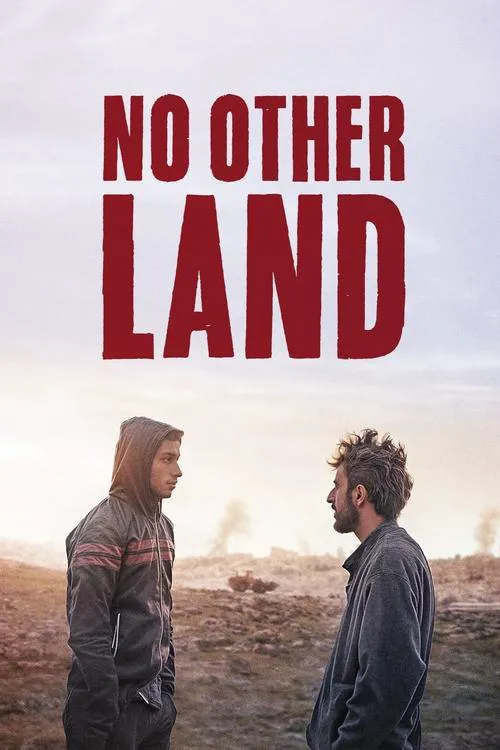No Other Land

Plot
Set against the backdrop of the brutal displacement of Palestinians in the occupied West Bank, "No Other Land" is a poignant and powerful exploration of the complexities of the Israeli-Palestinian conflict. Directed by and starring a Palestinian-Israeli collective, this cinematic masterpiece sheds light on the human cost of occupation and the resilience of a people fighting for their rights. In the heart of Masafer Yatta, a community in the southern West Bank, lies a centuries-old village on the verge of destruction. The Israeli military has been encircling the village, intent on displacing its residents to make way for an army firing zone. For the Palestinian residents of Masafer Yatta, this is not new. The village has been threatened with demolition multiple times, but the residents have consistently resisted, citing their deep roots to the land. At the center of this drama is Basel, a young Palestinian activist who has dedicated his life to fighting for the rights of his community. As he struggles to mobilize international attention and support for the village's plight, he meets Yuval, a Jewish-Israeli journalist who is investigating the story. Initially, their meeting is marked by skepticism and mistrust; after all, Yuval's people are the ones perpetrating the displacement of Basel's people. However, as Basil and Yuval begin to work together, they develop an unlikely alliance. Yuval, driven by a sense of moral responsibility and a desire to tell the truth, gains a deeper understanding of the Palestinian experience and the systemic injustices they face. Basil, in turn, benefits from Yuval's journalistic expertise, which enables him to amplify the village's story to a wider audience. Through their collaboration, the film masterfully weaves together the personal and the political, as Basil and Yuval navigate the complexities of their relationship. As they confront the harsh realities of the occupation, they must also grapple with their own conflicting identities and loyalties. For Yuval, this is particularly challenging, as he is forced to confront the painful truth that his people's policies are responsible for the suffering of the Palestinians. As the story unfolds, the stakes grow increasingly higher. The Israeli military is determined to evict the residents of Masafer Yatta, and the Palestinians are determined to resist. The film captures the raw emotions and intense drama of these confrontations, which play out against the backdrop of a seemingly inevitable displacement. Throughout the film, the Palestinian collective's commitment to authenticity is palpable. The cinematography is evocative, capturing the beauty and resilience of the Palestinian villagers, as well as the stark harshness of the occupation. The performances, too, are nuanced and powerful, conveying the complexity of the characters' emotions and motivations. The film also skillfully explores themes of identity, solidarity, and shared humanity. Basil and Yuval's unlikely friendship grows into a testament to the power of human connection, even in the face of profound structural injustice. As they work together, they come to understand that, despite their differences, they are bound together by a shared experience of struggle and resistance. "No Other Land" is ultimately a poignant and searing indictment of the Israeli occupation and its devastating impact on Palestinian communities. The film serves as a critical reminder that the struggle for Palestinian rights is a fundamental issue of human rights and dignity. At the same time, it offers a powerful testament to the resilience of the Palestinian people and their capacity for hope and resistance in the face of overwhelming adversity. In Basil and Yuval's story, the film finds a powerful narrative thread, one that illuminates the complexities of the Israeli-Palestinian conflict and highlights the need for greater empathy and understanding. "No Other Land" is a masterful and moving film that will leave audiences informed, moved, and inspired to act in support of the Palestinian people and their enduring struggle for justice and self-determination.
Reviews
Recommendations




